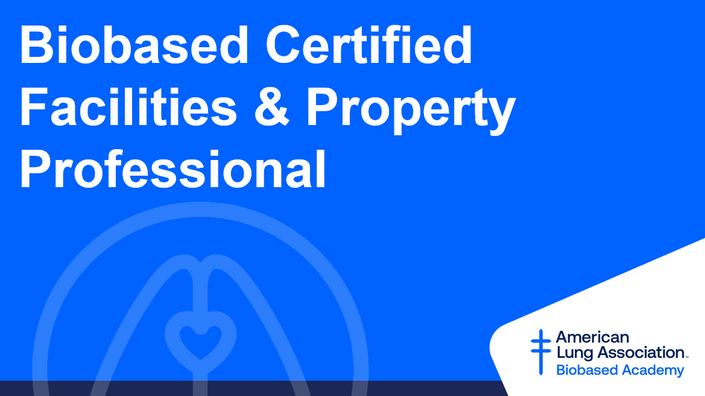Available Courses
Biobased Certified Fleet Professional (BCFP)™
Upon completion of the Biobased Certified Fleet Professional (BCFP)™ course, participants will have a firm understanding of how and why biobased fleet products are safe, renewable, and reliable alternatives to traditional and petroleum-based products that improve operational, health, safety, and environmental performance. Participants will also understand the type and variety of biobased products and fuels available, and how to procure them. Professionals will also have a general understanding of operational, health, and safety best practices and fleet sustainability best practices and certification programs.
Programmatic Benefits and Purpose
- Benefit human and environmental health through reduced exposure to harsh chemicals and emissions produced through the use and production of petroleum-based products.
- Assist organizations in achieving health and environmental goals with biobased fleet products.
- Increase professional knowledge of biobased fleet products and associated benefits.
- Contribute to the U.S. economy by increasing the use and sale of biobased products produced from domestic renewable resources, with emphasis on biobased products made from soy.
- Educate leading fleet professionals and assist in the implementation of sustainable, cutting-edge fleet best practices and biobased products to create ideal candidates for local, state, national, and international awards and certifications.
At the completion of this certification program, participants will gain:
- Awareness of the health and environmental impacts of air and water pollution and exposure to harmful chemicals.
- Awareness of the requirements and liabilities associated with spills and releases of pollutants and contaminants.
- An understanding of basic human physiology and the impacts of exposure on human health.
- An understanding of the current definitions and meanings of commonly used terms related to environmental sustainability and sustainable fleet operations.
- An understanding of biomass-based diesel fuel standards, differences, performance attributes, storage and blending procedures, use, and more.
- A general understanding of fleet sustainability best practices and certification programs.
-
An understanding of the type and variety of biobased fleet products available for operations and maintenance activities, with emphasis on soy biobased products.
Biobased Certified Facilities and Property Professional (BCPP)™ - *NEW*
Upon completion of the Biobased Certified Facilities and Property Professional (BCPP)™ course, participants will have a firm understanding of how and why biobased facilities and grounds products are safe, renewable, and reliable alternatives to traditional and petroleum-based products that improve operational, health, safety, and environmental performance. Participants will also understand the type and variety of biobased facility and grounds products available, and how to procure them. Professionals will also have a general understanding of the basics of sustainable building best practices and common sustainable building certification programs.
Programmatic Benefits and Purpose
- Benefit human and environmental health through reduced exposure to harsh chemicals and emissions produced through the use and production of petroleum-based products.
- Assist organizations in achieving health and environmental goals with biobased facility and grounds products.
- Increase professional knowledge of biobased facility and grounds products and best practices.
- Contribute to the U.S. economy by increasing the use and sale of biobased products, with emphasis on soy biobased products.
- Educate leading professionals and assist in the implementation of sustainable, cutting-edge facility and grounds best practices and biobased products to create ideal candidates for local, state, national, and international awards and certifications.
At the completion of this certification program, participants will gain:
- Awareness of the health and environmental impacts of air and water pollution and contact or exposure to harmful chemicals.
- Awareness of the requirements and liabilities associated with spills and releases of pollutants and contaminants.
- An understanding of basic human physiology and the impacts of exposure on human health.
- An understanding of the current definitions and meanings of commonly used terms related to environmental sustainability and sustainable building practices.
- A general understanding of sustainable building best practices and certification programs.
-
An understanding of the type and variety of biobased products applicable for facility and grounds operations and maintenance activities, with emphasis on soy biobased products.
Start your biobased journey at no cost today!
Use code USB23 at checkout for complimentary access!

Biobased Certified Professionals
Biobased Certified Fleet Professional (BCFP) Certificates Issued: 107
Biobased Certified Facilities and Property (BCPP) Professional Certificates Issued: 18
"Biobased Academy is a great way to expose fleet and facilities professionals to the environmental, health, and safety benefits of transitioning to biobased products."
- Sarah Mark, BCFP, BCPP, Fleet and Facilities Manager, City of Moline, Illinois


"As a Bio Ambassador and leader of a fleet, I could not be more excited about the launch of the American Lung Association’s Biobased Academy. ALA’s comprehensive program further exposes fleet and facility professionals to the environmental, health, and operational benefits of biobased products. We cannot wait for our own fleet professionals to take a deep dive into this course."
- Tim Fitzgerald, BCFP, Consulting Fleet Management Director, City of Atlanta Department of Public Works
"The Port Authority of New York & New Jersey is thrilled to be part of this important environmentally conscious initiative. It is education like this offered through the ALA Biobased Academy that will ultimately help promote the environmental benefits from using biodiesel in vehicles and facility biobased products."
- Jim Hineson, BCFP, Sustainability Fleet Coordinator for the Port Authority of New York & New Jersey


"My fleet team and I are proud to support the Biobased Academy, an outstanding program and powerful collaboration that I fully expect will bring more fleets across the nation on board to reap the benefits of biobased products."
- Mahanth Joishy, BCFP, Fleet Superintendent for the City of Madison, Wisconsin
"USB continues to partner with ALA to realize our vision of delivering sustainable soy solutions to every life, every day, and that includes the building and facilities community. I am extremely proud that farmers grow sustainable crops for both food and new uses, like many that are offered for building solutions. Not only does it increase our bottom line, but it also offers more sustainable buying options for professionals as well protects worker health and the environment."
- Susan Watkins, United Soybean Board Director, Innovation and Technology Priority Area Coordinator


"The Lung Association is proud to partner with USB to offer this comprehensive training program that educates professionals on the operational, health, safety and environmental benefits of biobased alternatives."
- Angela Tin, BCPP, BCFP, Senior Director of Nationwide Clean Air Initiatives, American Lung Association

Our Partner: United Soybean Board
Because of the potential for biobased products to create new markets for soybeans, U.S. soybean farmers have invested millions of dollars to research, test and promote biobased products. Much of this work was done through the United Soybean Board, which is composed of 77 U.S. soybean farmers appointed by the U.S. Secretary of Agriculture to invest soybean checkoff funds. As stipulated in the Soybean Promotion, Research and Consumer Information Act, USDA's Agricultural Marketing Services has oversight responsibilities for the soybean checkoff.
Learn more by visiting soybiobased.org
Disclaimer: The information and recommendations presented herein are based on available information and data and do not necessarily represent the opinions or positions of the American Lung Association or its partners. Furthermore, the availability of this program and its content do not constitute an endorsement of actions, products, or views by the American Lung Association or its partners.



